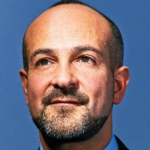Rationing Health Care: By Intention or Default?
Rationing Health Care: By Intention or Default?
April 28, 3:00-3:45 pm EDT
The U.S. has long rationed health care—by factors that include income, immigration status, age, and disability—but it’s rarely explicit or acknowledged. When the coronavirus struck, Americans were forced to confront this uncomfortable fact. Who gets a ventilator if they are in short supply? How do we decide who should be tested for the virus? Who should wear a mask (and what kind)?
Can the conversations we’re having during this crisis lead us to a future where decisions are more transparent, intentional, and equitable? Join Health Innovators Fellows Joe Betancourt, Stacy Lindau, and Monica Lypson in conversation with The New York Times’ Margot Sanger-Katz as they consider these questions in the first webinar of the Health Care at an Inflection Point series.
 Joseph Betancourt, MD, MPH, is the vice president and chief equity and inclusion officer of Massachusetts General Hospital, the founder, senior advisor, and faculty of the Disparities Solutions Center (DSC) at Mass General, faculty at the Mongan Institute, an associate professor of medicine at Harvard Medical School, and a practicing internal medicine physician. He has also served on the leadership team of the Mass General Center for Diversity and Inclusion. Dr. Betancourt is a nationally and internationally recognized expert in health policy, health care disparities, diversity, and cross-cultural medicine, and has served on several Institute of Medicine Committees, including those that produced the landmark reports, Unequal Treatment and Increasing Diversity in the Healthcare Workforce. He also advises private industry, government, and not-for-profit health systems on approaches to eliminating racial and ethnic disparities in health care. He sits at on the Board of Trinity Health, a large national health system, and sat on the Boston Board of Health and the Board of Neighborhood Health Plan in Boston. Joseph is a Fellow of the inaugural class of the Health Innovators Fellowship and a member of the Aspen Global Leadership Network.
Joseph Betancourt, MD, MPH, is the vice president and chief equity and inclusion officer of Massachusetts General Hospital, the founder, senior advisor, and faculty of the Disparities Solutions Center (DSC) at Mass General, faculty at the Mongan Institute, an associate professor of medicine at Harvard Medical School, and a practicing internal medicine physician. He has also served on the leadership team of the Mass General Center for Diversity and Inclusion. Dr. Betancourt is a nationally and internationally recognized expert in health policy, health care disparities, diversity, and cross-cultural medicine, and has served on several Institute of Medicine Committees, including those that produced the landmark reports, Unequal Treatment and Increasing Diversity in the Healthcare Workforce. He also advises private industry, government, and not-for-profit health systems on approaches to eliminating racial and ethnic disparities in health care. He sits at on the Board of Trinity Health, a large national health system, and sat on the Boston Board of Health and the Board of Neighborhood Health Plan in Boston. Joseph is a Fellow of the inaugural class of the Health Innovators Fellowship and a member of the Aspen Global Leadership Network.

Stacy Tessler Lindau, MD, MBA, is a tenured professor at the University of Chicago. Stacy’s work and her interdisciplinary lab focus on engineering solutions to injustice with the patients and communities they serve. She is also the founder and chief innovation officer of NowPow, LLC, a social enterprise IT company, and president of MAPSCorps, a community asset mapping organization. Catalyzed by a 2012-2015 Health Care Innovation Award from the Centers for Medicare & Medicaid Services, these organizations close the information gap about vital community resources while creating meaningful jobs, especially for youth. Also a practicing gynecologist, Stacy also leads the Program in Integrative Sexual Medicine at the University of Chicago Medicine, which seeks to preserve sexual function in women affected by cancer. She is director of WomanLab, a virtual platform to promote preservation of female sexual function after cancer and across the life span and she was founding chair of the Scientific Network on Female Sexual Health and Cancer. She has been published widely in the highest impact medical journals. Stacy earned her bachelor’s degree at the University of Michigan and her medical degree at Brown University. She completed her Obstetrics and Gynecology residency at Northwestern University and earned her master’s degree in public policy at the University of Chicago. She was a Robert Wood Johnson Foundation Clinical Scholar at the University of Chicago and served the program’s National Advisory Committee. Before medicine, Stacy worked at Wall Street Journal Television, a division of Dow Jones & Company, Inc. Stacy is a Fellow of the second class of the Health Innovators Fellowship and a member of the Aspen Global Leadership Network.

Monica L. Lypson, MD, MHPE, is the vice-chair for faculty affairs and the division director of general internal medicine at The GW Medical Faculty Associates. In this role, Dr. Lypson provides visionary leadership for a diverse group of faculty involved in educational and patient care innovation, research, and community outreach. In addition, she is a professor at The George Washington University School of Medicine & Health Sciences. Prior to these roles, she was the director of medical and dental education for the Department of Veterans Affairs, where she provided leadership, oversight, and coordination for VA’s graduate and undergraduate medical and dental education program. Dr. Lypson is a board-certified general internist and has served in many hospital leadership roles at the Ann Arbor VA Healthcare System. She also spent years in educational leadership roles at the University of Michigan Medical School, including as assistant dean for graduate medical education. She is a clinician educator and has published over 70 peer-reviewed publications in top-tier medical education journals in the areas of resident assessment, communication skills, cultural competency education, workforce diversity, and faculty development. Dr. Lypson has held many national roles focused on health professions education, and she is president-elect for the Society of General Internal Medicine. Monica graduated from Brown University and received her medical degree from Case Western Reserve University School of Medicine. She completed her graduate medical training at the Brigham and Women’s Hospital. Subsequently, Monica went on to complete a Robert Wood Johnson Clinical Scholars program at the University of Chicago and a master’s in Health Professions Education at the University of Illinois at Chicago. Monica is a Fellow of the fourth class of the Health Innovators Fellowship and a member of the Aspen Global Leadership Network.

Margot Sanger-Katz is a domestic correspondent for The New York Times, where she writes about health care for The Upshot, the Times site about politics, economics, and everyday life. She is also a frequent panelist on Kaiser Health News’s podcast, “What The Health?” Before joining the Times, she was a reporter at National Journal and The Concord Monitor and an editor at Legal Affairs and the Yale Alumni Magazine. In 2014, Sanger-Katz completed a Knight-Bagehot Fellowship in Economics and Business Journalism at Columbia University.
More About This Series
Produced by the Aspen Institute’s Health Innovators Fellowship
and
Health, Medicine and Society Program
While the COVID-19 pandemic exposes longstanding challenges in the U.S. health care system, it also offers an opportunity to rethink current approaches and consider new ideas for building a healthier nation.
COVID-19: Health Care at an Inflection Point, a series co-produced by the Aspen Institute’s Health Innovators Fellowship and Health, Medicine & Society Program, will explore these challenges and opportunities. Each session, moderated by a well-known journalist, will highlight a specific issue that the pandemic has surfaced and ask the question, How can we use this pivotal moment to address deep-seated health care problems? Aspen Institute Health Innovators Fellows will describe their experiences on the ground and propose models of change. In a dark time, their forward-looking ideas provide reason for hope.
Other topics in this series:
- COVID-19 Testing: The Hope and the Hype
- Confronting Inequities in the Health Care System
- Delivering Health Care in New Ways